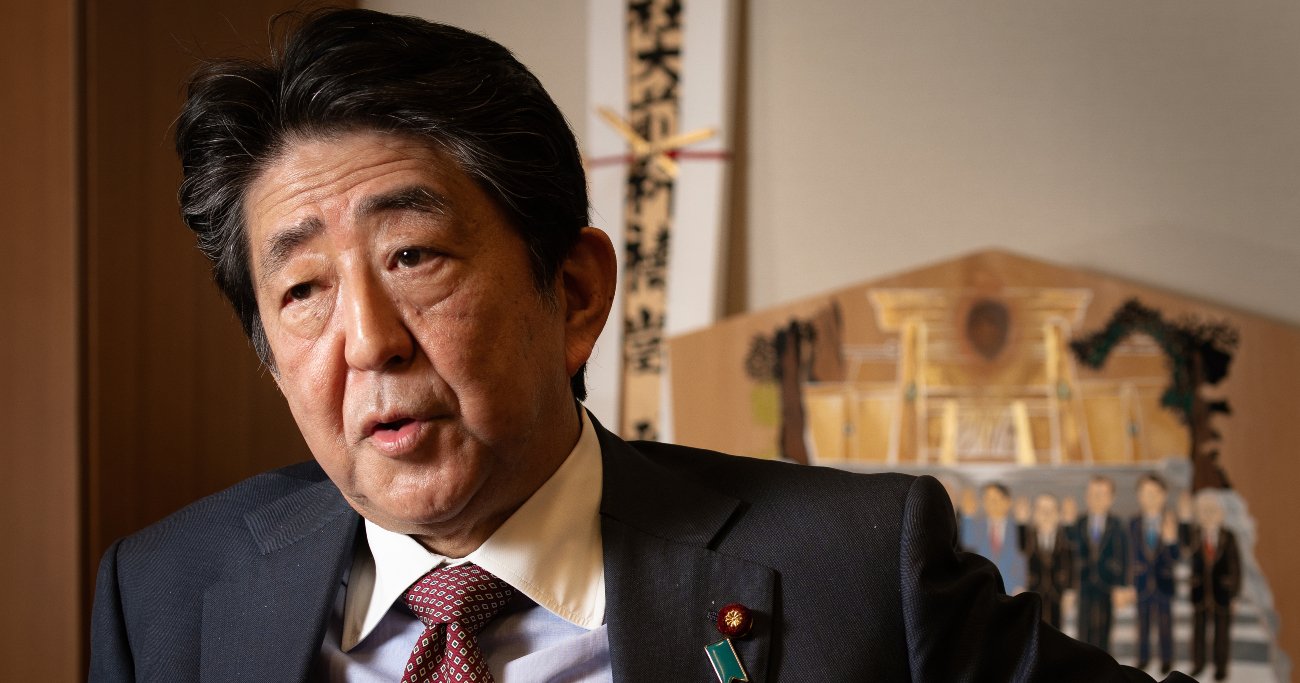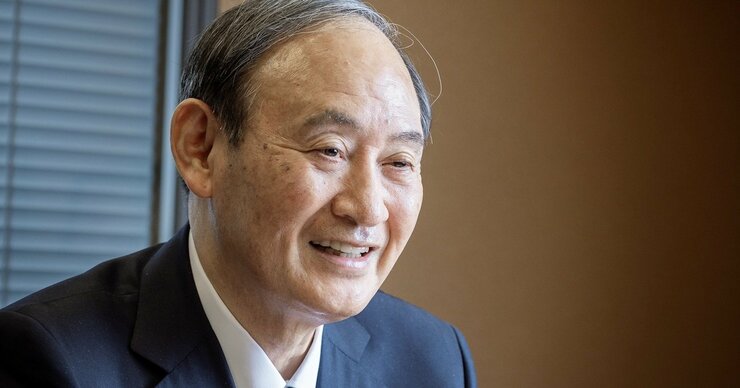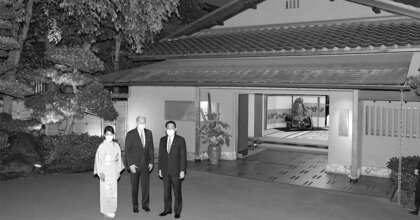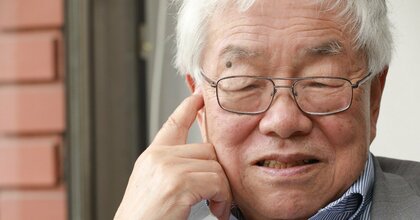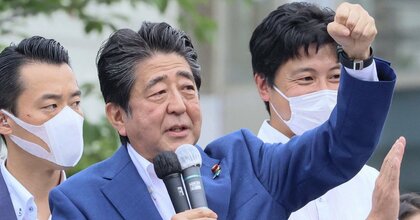Originally published in Japanese on Mar. 23, 2022
Talks with Putin
DIAMOND: You participated in summit talks with Russian President Vladimir Putin 27 times in total. Why do you think he decided to invade Ukraine?
ABE: Mr. Putin strongly distrusts the U.S., which stems from the expansion of NATO (North Atlantic Treaty Organization). In 1990, during the discussions on the reunification of East and West Germany, [then] U.S. Secretary of State James Baker met with General Secretary Mikhail Gorbachev of the Soviet Union and told him that NATO’s jurisdiction would expand “not one inch eastward.”
However, NATO continued to grow to include Poland, the Czech Republic and the Baltic states. Russia feels cheated by this.
Although the U.S. admitted that the words “not one inch eastward” were used in regards to NATO’s jurisdiction, its stance is that those words were merely a theory used in the context of negotiations, and are not written in the treaty. It says that that phrase was not a promise, nor a secret agreement. Mr. Putin mentioned his distrust that “they broke the promise and expanded NATO” when I also met with him.
DIAMOND: Did you think that Putin would actually launch a military invasion of Ukraine?
ABE: I was thinking the risk was rather high for the two eastern oblasts, because he had already done the same thing in Crimea.
There are two factors behind a war or conflict: One is a military imbalance. The sizes of the military forces of Russia and Ukraine differ greatly.
The other is misjudgments about the intentions or capabilities of the opponent or oneself, or an overestimation of oneself. In this case, I think that Ukraine and the U.S. initially thought that Russia would not make full use of its forces. Mr. Putin also did not expect that Ukraine would resist this hard.
DIAMOND: What do you think about the Kishida administration’s reaction to the invasion?
ABE: Russia’s actions are in violation of international law, and they are a serious challenge to the international order that has been built since the end of World War II. The international community must show solidarity in never permitting this kind of violence. The Kishida administration worked together with the U.S. to build consensus among the G7 (Group of 7), and is taking a firm position. I support Prime Minister Kishida’s decision.
Changes in Asia
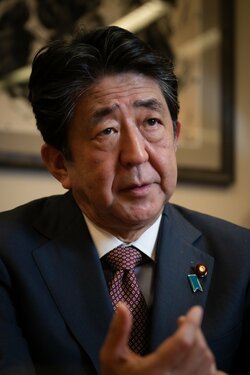 Photo by Y.A.
Photo by Y.A.
DIAMOND: What are the implications of this invasion for the situation in East Asia?
ABE: There is concern that what happened in Ukraine may happen in Taiwan as well. A large military imbalance is also present there. Neither Taiwan nor Ukraine have alliance partners. Without allies, there will be no countries to fight for them. That is the reality of the international community. Although arms have been sent to Ukraine, there are no countries that are fighting together with them.
There is another commonality: Both Russia and China are permanent members of the United Nations Security Council. If a permanent council member vetoes any resolution, the Security Council cannot fulfill its function. That is something that has become clear through this conflict.
Japan also shares borders with Russia and China. Thus, we need to enhance the U.S.-Japan alliance, and in order to do so, we must continue our own self-help efforts.
DIAMOND: What do you mean by “self-help efforts?”
ABE: Specifically, increase the defense budget. There is no country that will fight for another country that does not make efforts to protect itself.
There is the Taiwan Relations Act between the U.S. and Taiwan. However, although the law provides for the supply of defense equipment, defense obligations are not stipulated clearly. The U.S. has adopted a policy of “strategic ambiguity.”
The U.S. has not clarified whether it intends to support Taiwan if it is invaded. The strategy is to let China think that the U.S. may make an armed intervention to deter them, while letting the pro-independence forces in Taiwan think that it may not intervene to prevent them from going out of control.
However, I think this ambiguity is more of a danger now. The U.S. must make its intentions clear. If the U.S. clearly says it will make an armed intervention, China will avoid war with the U.S. and there will be no use of force. I think we must make this point clear.
More specifically, if the president of the U.S. says this, it will become clear.
DIAMOND: Looking back on history, there have been occasions where ambiguity was the wise choice. Deng Xiaoping of China chose ambiguity in terms of shelving the problem of the Senkaku Islands.
ABE: That is not correct. It is said that China shelved the problem because it would have been an obstacle to concluding the Treaty of Peace and Friendship between Japan and China. However, Japan never shelved or obscured this problem.
There is also the fact that China’s military was incomparably small back when the U.S. chose strategic ambiguity. Although there may be occasions where you can get by with ambiguity, I believe in many cases it will sow the seeds for future troubles.
DIAMOND: How strong is the threat of China actually to Taiwan?
ABE: I cannot quantify it in percentages, but China has clearly stated that Taiwan is a part of its territory, and also stated its intention to unify the island. It also does not deny the possibility of unification by force.
I think China believes in power. I am not referring specifically to General Secretary Xi Jinping, but I mean the attitude of the country.
China unilaterally declared that the entire area inside the Nine-Dash Line [the U-shaped line drawn by China to claim sovereignty over almost the entire South China Sea] is the territorial waters of China. It is actually sending government vessels into these waters to gain greater control of the area.
Against Taiwan, China is rapidly increasing the number of military aircraft entering Taiwan’s air-defense identification zone (ADIZ), and flying these aircraft in an unprecedented manner of circumnavigating Taiwan. This is clearly an act of changing the status quo by force.
Taiwan is an important friend of Japan, located 110 kilometers from Yonaguni Island. The Taiwan Strait and Bashi Channel are passages that may become chokepoints for Japan. Also, if China is going to invade, the airspace that it must dominate to ensure air superiority completely overlaps with Japan. There is no doubt that the situation will be defined as “Important Influence Situation” under Japan’s Legislation for Peace and Security.
That is why we must clearly convey our intentions to China.
When I had summit meetings with Mr. Xi in the past, I repeatedly told him not to misjudge the intentions of Japan to defend the Senkaku Islands. Although I did not receive an answer, we must not let China misjudge Japan’ intentions.
Nuclear sharing
DIAMOND: You have brought up the discussion on nuclear sharing. [Editorial note: Nuclear sharing is a mechanism to deploy U.S. nuclear weapons within another country’s territory and jointly operate them. It has been implemented in five NATO countries.]
ABE: What I am saying is that “we should not consider discussions about the reality of how global security has been maintained as a taboo.” Many Japanese, including politicians, do not know about nuclear sharing. Regarding discussions on nuclear weapons, some say we must emulate Germany. Germany participated as an observer in the Meeting of States Parties to the Treaty on the Prohibition of Nuclear Weapons, which comes close to denying nuclear deterrence.
However, at the same time, Germany has deployed U.S. nuclear weapons within its territory. If the weapons were to actually be used, it would be the German military that would deliver and drop the weapons. That is how Germany has secured its nuclear deterrence.
If you use nuclear weapons against a country, it may retaliate with nuclear weapons. That is how nuclear deterrence works. If you think that you won’t face retaliation, deterrence does not work.
Japan is under the U.S. nuclear umbrella in the form of extended nuclear deterrence. However, the deterrence conditions in Germany, where nuclear weapons are deployed, and those of Japan, which has no nuclear weapons and is reliant on the nuclear weapons located in the U.S., are quite different. That is why five NATO countries decided to deploy U.S. nuclear weapons in their own territories.
And they are also going through simulations and training on how to gain consensus within NATO when the weapons would be actually used. They share technical information on nuclear weapons with the U.S. Japan has never had a discussion with the U.S. on the decision-making process.
DIAMOND: Isn’t there a conflict between nuclear sharing and the three non-nuclear principles?
ABE: There is a conflict with the principle of not permitting the introduction of nuclear weapons on Japanese territory.
DIAMOND: As prime minister, you repeatedly said Japan would stand fast on the three non-nuclear principles. However, now you think that the discussion should occur despite that conflict. Is that primarily due to the invasion of Ukraine?
ABE: I think we should always have that kind of discussion; the point is whether there is a political situation that allows for the discussion. As you may know, the interpretation of the “not permitting the introduction” tenet of the three non-nuclear principles varies. However, is the interpretation or the duty to protect the lives of the citizens more important? We must not look away from the reality of defending our own security.
In addition, I am not saying that “we should implement nuclear sharing.” I am saying that we must not consider the explanations of nuclear sharing and discussions on how global security has been maintained based on such explanations as a taboo.
Please understand what I have said accurately when you ask questions.
DIAMOND: Do you think the citizens of Japan can tolerate a “taboo-free discussion,” including on nuclear sharing?
ABE: In a survey by a TV broadcaster, the majority of viewers answered that the “discussion must take place.” Why do many European countries wish to join NATO? Because their country will be defended, including through nuclear deterrence. And, if Ukraine was a member of NATO, there would have been no Russian invasion. That is the reality.
(Originally written in Japanese by Ryuko Sugimoto, translated by Erklaren Inc., and edited by Connor Cislo)
Shinzo Abe served as prime minister of Japan from 2006-07 and 2012-20; he was assassinated in July 2022.

